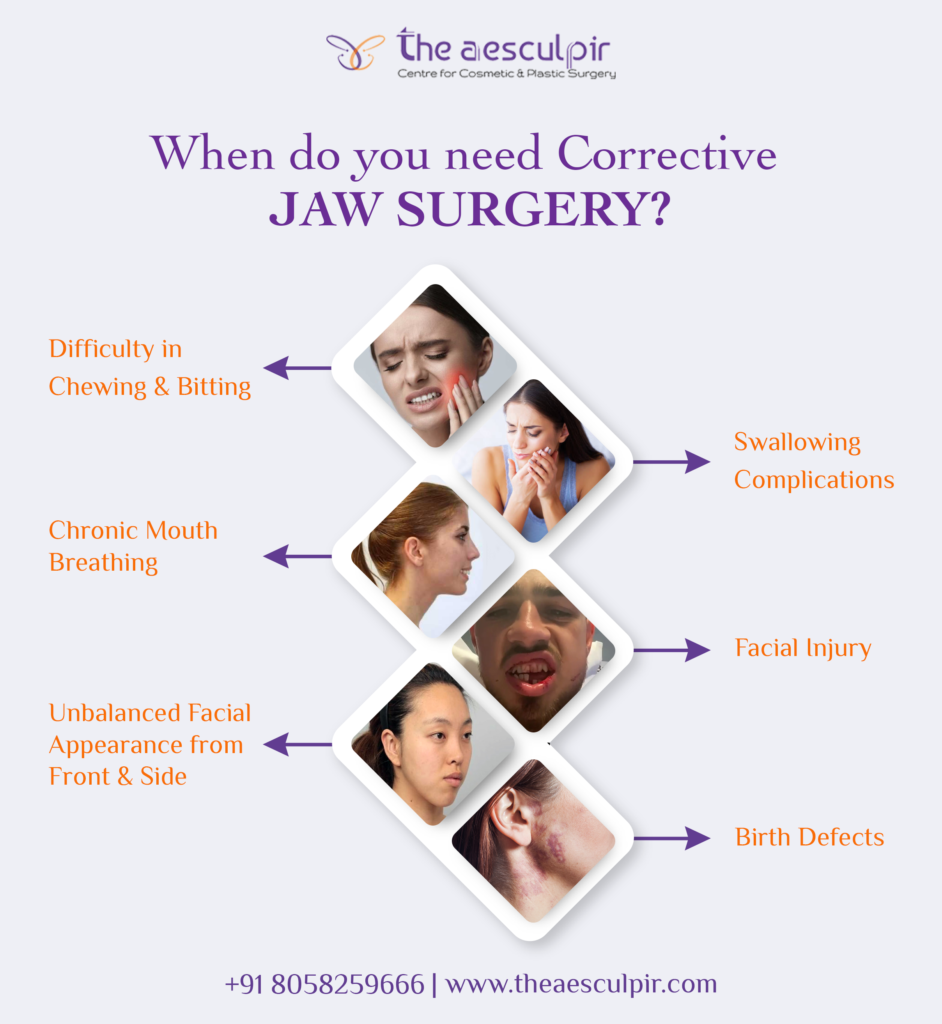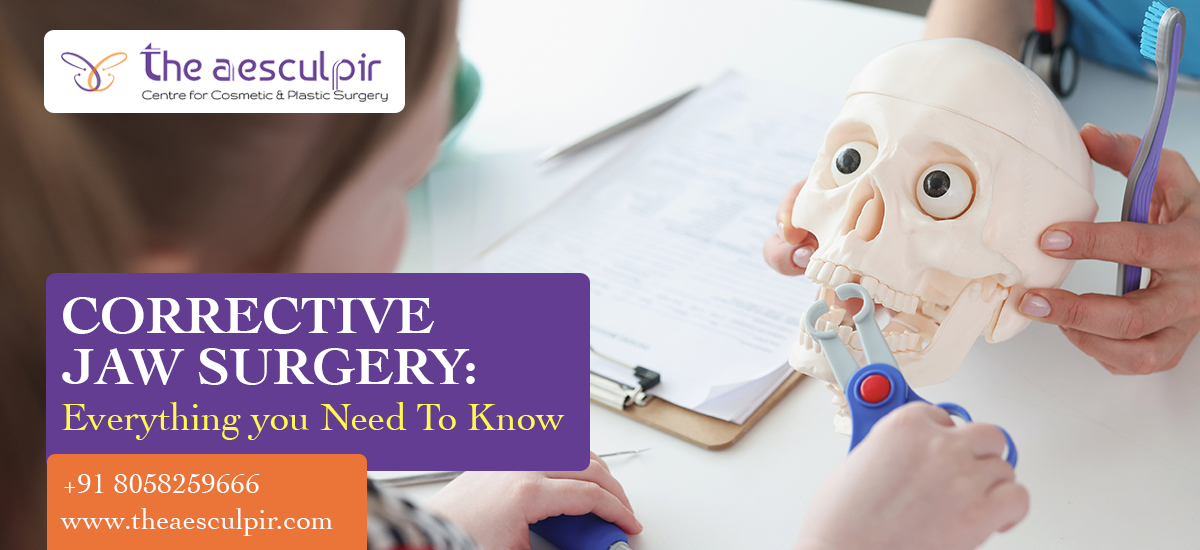‘The first step towards a better you begins here, at Aesculpir.’
A properly aligned and well-functioning jaw is crucial in the normal functioning of our daily lives. Generally, the upper and lower jaws are appropriately positioned. This results in facial harmony and normal jaw functionality. However, when this alignment is interrupted, several abnormalities occur. A misaligned jaw can cause several cosmetic and functional difficulties. Corrective jaw surgery is a boon for patients who have jaw bone asymmetry or misalignment.
Professionals in Aesculpir Clinic have compiled a detailed guide that covers everything you need to know about corrective jaw surgery in Delhi.
What is Corrective Jaw Surgery?
Orthognathic surgery, often known as corrective jaw surgery, is a procedure that involves repositioning the upper and lower jawbones. The procedure is performed to correct any skeletal or dental anomalies, whether minor or serious. Some minor skeletal abnormalities can be rectified with orthodontic treatment and braces. But in certain cases, when the condition is severe, surgery is required.
Misalignment of the jaw not only creates problems, such as chewing difficulties, speech inconsistencies, and facial deformities, but it can also lead to severe pain, swelling, and disorders like sleep apnea. Corrective jaw surgery in India can improve overall proportion and alignment issues as well as aesthetics and functionality.
Thorough screening and examination are necessary to determine people who are eligible for corrective jaw surgery. You are eligible if you:
- Are over a specific age. In general, surgery is performed once bone development ceases, which occurs between the ages of 14 and 16 years in females and 17 to 21 years in males.
- Experience difficulty in biting and chewing.
- Have facial asymmetries, teeth malalignment causing bite issues.
- Have bruxism, sleep apnea, and speech impairments.
- Have reasonable surgical expectations.
- Are in overall good health.

Types of Corrective Jaw Surgery & Procedures
Corrective Jaw surgery procedures are classified into several types. These are often performed by specialists where patients are sedated before the procedure. There are various techniques and approaches developed which can be used depending on the circumstance. Some of the most common types of corrective jaw surgery are as follows:
- Maxillary osteotomy is a surgical procedure done on the upper jaw to address projecting upper jaw and bite abnormalities.
- Mandibular osteotomy is used to repair problems related to the lower jaw. This is done for the lower jaw if it is receding or protruding.
- Genioplasty, often known as ‘chin surgery’, is done to treat a very small chin, also known as ‘deficient chin’.
- A bimaxillary osteotomy, often known as ‘double jaw surgery, is performed to address upper and lower jaw defects simultaneously.
- Mandibular advancement surgery is a common procedure used to treat sleep apnea effectively. Airway blockage can occur from bone misalignment. This can be treated with corrective surgery.
Treatment
Surgeries
Experience
Quality
What to Expect After the Surgery?
Some post-operative symptoms are pretty common just after the surgery. These symptoms are nausea, discomfort, and swelling. The symptoms are temporary and will go away within a few days of the procedure.
Is corrective jaw surgery painful?
Post-operative pain is very common. The dental pain associated with jaw correction surgery is similar to that of tooth extraction. But this can often be relieved by OTC painkillers.
A corrective jaw surgery recovery time might take anywhere from 10 days to 3 weeks. The entire bone regeneration process usually takes 3 to 4 months. It is typically advised that a person take 2 to 3 weeks off from work, after the surgery. During the recovery period, the surgeon will usually offer you a set of rules and instructions that must be followed to ensure that you heal well.
Some frequent post-surgery guidelines include:
- Consuming a liquid diet and soft foods to avoid putting strain on the jaw. Solid foods should be avoided for a few days after the surgery.
- Avoid taking tobacco products.
- Avoid engaging in any strenuous physical activities.
- Maintain appropriate hygiene to avoid infections.
- Rinse your mouth with warm saltwater.
Braces are also frequently used following jaw correction surgery because they can assist the teeth to return to their proper positions and restore jaw as well as tooth alignment.
The Benefits of Corrective Jaw Surgery
Patients often ask, ‘Is corrective jaw surgery worth it?’ There are various advantages to having corrective jaw surgery. Some of them are given below:
- Pain Alleviation: The procedure gives significant relief from the discomfort associated with a misaligned jaw. The misalignment might cause undue strain on the surrounding jaw muscles. Following surgery, the muscular strain is reduced.
- The ability to chew properly improves following the surgery The operation aids in tooth alignment and restores the teeth’s optimal biting function making chewing to become easier.
- Misaligned teeth undergo wear and tear as well as damage After the surgery, the corrected jaw and properly aligned teeth are less prone to damage.
- After the surgery, there is a significant improvement in one’s ability to speak properly. A properly aligned jawline contributes to better pronunciation and speech abilities.
- Following the procedure, the patient’s facial look improves dramatically. It visually appears more harmonic, symmetrical, and balanced. Many individuals have reported a significant increase in their self-confidence after undergoing the surgery.
Risks of Corrective Jaw Surgery
There are certain risks and side effects associated with blepharoplasty surgery.
Jaw correction surgery, like many other operations, is not devoid of risk. Before undergoing the surgery, you should be aware of the following risks:
- Blood loss
- Jaw damage and injury
- There is always a possibility of infections.
- Jaw fractures are uncommon, although they can occur in specific circumstances.
- The jawbone might revert to its original position.
- There might be an issue while biting, which would need more surgeries to rectify.
- There may be discomfort in the jaw joint.
Consultation with an experienced surgeon at a reputable facility like Aesculpir Clinic guarantees that problems and risks are kept minimum. We ensure that the procedure is safe and successful.
How Much Does Corrective Jaw Surgery Cost?
The cost of corrective jaw surgery is highly variable. As each treatment is unique, the surgical process, the time required for a single surgery, the cost of anesthetic, and the cost of postoperative care are all distinctive. Thus there can be no fixed corrective jaw surgery cost.
The final cost of corrective jaw surgery is affected by factors such as:
- The clinic’s infrastructure, ambiance, employees, equipment, and services.
- The surgical approach was taken during the surgery.
- The cost of anesthesia: Generally, local anesthesia is less expensive than general anesthesia.
- The specialist’s experience.
- The cost of post-operative care, as well as pre-operative medicines and tests, might vary.
The final estimation of the corrective jaw surgery cost can only be done after a visit with the doctor.
Takeaway
The Aesculpir Clinic is a cutting-edge cosmetic facility that aims to provide a holistic solution to all of your aesthetic issues underneath one roof. We provide a wide range of procedures and treatments at the clinic at extremely reasonable prices. At Aesculpir, giving the finest quality of treatment is our utmost priority and you will walk out satisfactorily with your best face.
